- Home
- Regan Walker
Racing with the Wind (Agents of the Crown) Page 3
Racing with the Wind (Agents of the Crown) Read online
Page 3
She clenched Midnight’s flanks with her thighs and raised her arms to embrace the sun. It had taken her a long time to be able to ride this way without fear—and conquering that fear had given her even more satisfaction. The victory had not come without a few falls, and her uncle had soundly scolded her for each; the bridge of her nose still bore a faint scar. But she’d refused to give up and finally had been rewarded.
She returned Midnight to the stables. As she left the horse with the groom, Mary remembered her uncle’s words and considered what to wear for luncheon. Dressing as a young lady was now necessary. It was her uncle’s wish she be at ease among the nobility where she would one day take her place, and that meant dressing as one of them; though Mary wondered if she could ever be happy in a society where women were so often confined to the home. But she loved her uncle, so she would dress to please him. After all, he had given her great freedoms.
The gown she chose was appropriately unusual. Though the ball had seen her in the ivory that labeled her a debutante, she preferred jewel tones for her attire and disdained the pastels preferred by most women her age. For that reason she chose a deep amber traveling gown. The bodice dipped in a crescent across her full breasts, and tiny white lace edged the neckline and cuffs of the long fitted sleeves. Her maid told Mary the color of the gown highlighted her hair, which she tied back with a slender black ribbon since she was at home. Only one piece of jewelry graced her body, a small gold signet ring on her right hand, a family heirloom her mother had given her when she turned seventeen. Mary’s initials were engraved in flowing script in place of the great aunt’s that once it had borne.
Reminded of the lateness of the hour, she hurried. Lunch and her uncle waited. Milly wanted to fix her hair but there wasn’t time.
“Milady, I can put it up in but a minute!”
“No, Milly, leave it as it is. You can put it up before we leave for London. I am already late and I must hurry lest Uncle be upset.”
Milly sighed and shook her head, a frequent reaction.
Racing down the stairs, skirts flowing out behind her, Mary might have been fleeing a fire. Her cheeks felt flushed from the ride, and wisps of loose hair fell about her temples as she stepped onto the terrace—where she came to an abrupt halt. The round table was set with several dishes, and a man was seated with her uncle and her mother.
Even from a distance, the man was sensual beyond her experience. The power of his body, the casual way he leaned back in his chair… And there was so much of him. With one black-booted leg stretched out and dark hair waving down to his nape, he seemed a pirate relaxing on the deck of his ship. There was something familiar about him, too.
Oh, God. It was the man who had watched her at the ball.
Slowly Mary walked to the table. As she drew near, the man looked up and smiled then rose from his chair. Her stomach tightened. That dark stare and handsome face… Men did not usually disturb her, at least not their looks. This one did. He was a force, so much masculinity in one man.
His eyes followed hers as she appraised him, amusement evident in his wry smile. How arrogant! How annoying! How embarrassing.
Her uncle and the man both rose, the dark-haired visitor towering above her, well over six feet.
“Mary, allow me to introduce Hugh Redgrave, Marquess of Ormond, the Duke of Albany’s son,” her uncle said. “Lord Ormond’s family estate is not far from here. You’ve not met him before because, as we were just discussing, he’s been away. He resides mostly in London.”
Mary remembered her mother speaking of the Duke and Duchess of Albany, but she had no memory of meeting them. She considered the tall man as his eyes followed a path from her face down her body and back to her lips. His eyes drew her into their depths, so dark and intense at first she thought they were black. Soon she saw they were the darkest brown, the color of aged brandy. But if eyes were windows to the soul, as the French liked to say, his soul was too dark to see clearly.
The man was arrogant and too sure of himself, so she determined to boldly meet his stare. Few men held her penetrating gaze when she bestowed it, a fact she took pride in; but he did. A wave of heat passed between them. Her heart raced in her chest.
The visitor bent over her offered hand, warm lips brushing her knuckles, and Mary felt the touch all the way to her toes. Forcing herself to regain control, she said, “It’s an honor to make your acquaintance, my lord.”
He chuckled in response. Damn the man’s smugness.
Mary sat down, and her mother smiled at her. “Have you been riding this morning, dear?”
“I have.” Mary felt a wave of pleasure wash over her. She forgot all about the smug Lord Ormond and said, “’Tis a lovely day, and Midnight is in fine form.”
Mary picked up a bite of fish with her fork but instantly put it down; her appetite had deserted her when she saw Ormond’s continuing regard. How odd. Her appetite never left her unless she was ill, and that was a rare occurrence. A servant brought a plate of cheeses, bread and fruit to complement the lunch, and she considered the fruit, thinking she might have a piece, but at last she decided against it. A rich claret was also brought, and this she sampled. At the very least she could manage a glass of wine.
* * *
Hugh contemplated the girl briefly and could not resist asking, “Midnight?”
“My horse. Have you seen him?”
“I have.” Hugh shot the girl’s uncle a glance. “He’s magnificent.”
The girl’s eyes lit up and she flashed white teeth at him. “Yes, he is a beauty.”
Clearly she loved the great stallion. Her smile dazzled Hugh, and the image of her long legs wrapped around the flanks of that big black beast was still fresh in his mind. Suddenly he saw those long legs wrapped around him. The image surprised him, as he’d come here on business and not to ruin the daughter of a peer. But her beauty had beguiled him. And having seen her in breeches, he recalled well the curves that were hidden beneath her skirts. Slightly unnerved, Hugh made an effort to engage in lighter conversation.
“Did you hear about Prinny’s latest escapade?”
He’d thought the ladies would enjoy the gossip, but Lady Mary’s reply was terse. “He is always having some escapade.” Abruptly she turned to her uncle. “What do you think about the sad state of affairs on the Continent? Have any of your dispatches said whether the political climate is improving?”
The chit had dismissed him! Hugh’s throat tightened, but he quickly damped the anger that flared within him by taking a sip of wine. “Surely you do not bother with matters of a political nature on the Continent, Lady Mary?”
“Why, of course I bother,” she said sharply. “And having been to the Continent, having met some of their leaders, it’s a wonder to me we are not still at war even now.”
Hugh regarded Mary’s uncle, well aware of the work the man had been doing before returning to England. “Has she accompanied you to Paris, Lord Baynes?”
“Yes. She has,” the elder statesman said. “And quite to the advantage of the Crown.”
As the girl glanced at Lord Baynes, a smile in her eyes, Hugh wondered just what it was that had she done in Paris. It became obvious to Hugh that the older man was all too comfortable with his unusual niece, no doubt indulging her every whim.
The countess had not participated much in the conversation, and Hugh now found himself noting how very unlike Mary she was. Petite in stature, with auburn hair, blue eyes, and a quiet, gentle spirit, it seemed his friend Lambeth had been right; the woman would have difficulty controlling her daughter’s rebellious tendencies.
Talk continued as Mary and her uncle exchanged observations about the situation in Europe and the way ahead for France now that Napoleon was exiled and the aging Bourbon king had been restored to the throne. Hugh was surprised at the frank exchange between the two, more like two diplomats considering options than an uncle with his young niece. But before he could think to comment, the conversation took a turn.
; “Mother, shouldn’t we be off soon?” Mary asked.
The countess paused as if remembering. “Oh, yes dear, you are right.” Acknowledging her guests she added graciously, “Gentlemen, it’s been delightful. However, since my daughter has agreed to join me in some shopping and we have friends to see in London, I am afraid we must be away.”
The two women said their goodbyes and departed, leaving Hugh to ponder the effect Mary Campbell had on him. She was indeed outspoken, and yet he grudgingly admitted her comments accurately reflected the situation in France. Obviously the girl possessed an active mind and was well informed. A strong woman with a sharp mind? He knew another like that; a woman in France who had made such an impact Napoleon had even thrown her out of the country.
Of course, there was something disturbing about Lady Mary that he’d never considered with Germaine. He could not stop thinking about those long legs he had seen wrapped around her black stallion. Nor could he prevent himself from drinking in recollections of her beautiful face, her unusual green eyes and her full lips. He had wanted to kiss those lips even as she provoked him to anger.
No, he reminded himself. That would never happen. She was a young, marriageable woman. Not his type at all.
Chapter 3
“Mother, can we stop at Hatchard’s bookshop?”
Traveling the streets of London with her mother a few hours later, searching for items to purchase, Mary relished the activity swirling around her. The noise of the passing carriages and the shouts of their coachmen cracking their whips only increased that excitement.
The strange sound of the cockney calls from vendors selling their wares entertained her. One could buy fish and bread and all manner of food if one had the coin to do so. Mingled together were men dressed in fine coats, trousers and hats, and ladies in flowing skirts, pelisses and bonnets. Ragged street children brushed by, teasing each other while playing their games, adding to the cacophony of sound.
“Of course, dear. Did you have something in mind? We’ve not much time to browse.”
“I want to pick up a new novel by the author of Pride and Prejudice. Ever since I learned the author was a woman, I’ve been anxious to see what more she might write. Word has it this new novel is dedicated to the Prince Regent.”
“Who can imagine the Prince of Wales reading stories of love?”
Mary smiled. “Oh, I can imagine most anything of Prinny, Mother. And he and I seem to share a love of certain novels, which amuses me greatly.”
The stop at Hatchard’s did not take long, and with a copy of a book titled Emma tucked under her arm Mary decided with her mother to have tea before going on to Lord Baynes’s town house. They were just seated at a table looking out onto the street when her mother pulled off her gloves and leaned in close to whisper.
“This is the perfect time to pick up a few things you will need for Lady Huntingdon’s house party. She and her husband the earl will make for wonderful hosts. Perhaps a new gown and a warm cloak would be nice. The evenings are still quite cool.”
“If you think so,” Mary said. A long sigh escaped her as her attention shifted to the people strolling by outside. She didn’t mind participating in some of the season’s events, but she had no desire for a whirlwind of parties and gentlemen callers. While she often took joy in shopping, she wasn’t sure the purpose behind a new gown was to her liking. This house party was intended to bring eligible young people together, and Mary despaired of the matchmaking, of having to carry on meaningless conversations with men looking for wives to tend their homes but not do anything really interesting with their lives. She would not have Midnight to ride there, either.
Her mother took a sip of tea and joined her in gazing out the window. A wistful expression crossed her face.
“You’re thinking about Father, aren’t you?” Mary could see the sadness in her mother’s eyes, and that made her feel sad, too.
“Yes, I am,” her mother admitted. “I was thinking of that time many years ago when your father joined me in this same teashop just after a session in the House of Lords. France was our topic of discussion that day, too. I think your conversation at lunch must have reminded me…and then, being here again always stirs my memories. It might surprise you to know how much of his life he shared with me. Even the politics.”
“I am glad to know he shared all he was with you,” Mary hastened to say. “The memories seem to please you.”
“They do,” her mother admitted. “And the memory of how I loved him. How I still love him.” Her mother’s eyes filled with tears, but turning to Mary she smiled. “Just now I was remembering when I first realized he was the one.”
“How did it happen?” Mary could not recall her mother ever talking about this before.
“It was the evening we were both invited to dinner at the Earl of Danville’s home. When I saw William across the table, my appetite deserted me. I rather had to pretend my way through that meal.”
Mary’s heart stopped. No appetite? Was that a sign? Surely not. It had just been the ride. Yes, her vanished hunger had been a simple lingering effect of her ride.
“I eventually got my appetite back,” her mother continued, “but by that time I was quite smitten. Later, William told me it was the same for him.” She smiled. “He told me he fell in love at first glance. He was such a handsome man, with that winsome smile and those bright green eyes. And a quick wit, too. I shouldn’t wonder he captured my heart so easily.”
Mary hastily took another sip of tea. In her mind she saw the lazy smile of Lord Ormond, and a sudden shiver rippled through her.
“I just remembered,” her mother suddenly interjected, “that Lady Huntingdon—then Lady Emily—was at that dinner where I met your father.”
“She was? Was she married to the earl then?”
“No, we were both unmarried at the time. Emily and I were quite like you and Elizabeth, very good friends.”
That made Mary think about her good friend. What would Elizabeth say about her meeting Lord Ormond? Mary and her mother had been invited to Lizzy’s family home for dinner that night, so she would have a chance to ask her. Perhaps that was a good thing. Lizzy had a keen understanding of people. She would surely have something useful to say about Lord Ormond.
* * *
As the eldest son of the Duke of Albany, Hugh had always known he would one day inherit his father’s title. Nonetheless, he did not wish that day to come soon. A duke’s life was all about social responsibility, his father would remind him, which left little room for adventure; and though Hugh did not shy from the path for which he’d been groomed, his life had taken a turn many years ago that led him far from the quiet life of an ordinary nobleman. His father had been aghast when Hugh first told him he was going to France. He was the only heir, the man pointed out; it was out of the question, not to be done. But after Henry’s death Hugh had been so plagued by guilt that he could not stay. Everything reminded him of the boy.
Now he’d returned. Though he’d been in the field for a number of years, the restoration of King Louis to the throne of France allowed Hugh to spend most of his time in London, a change that pleased his father. And because the family’s investments and properties were well managed, Hugh hoped he could continue the pursuits he found most interesting, his secret work, the business of the Crown.
Before taking the fourteen-mile ride back to London that afternoon, he stopped to say goodbye to his mother. His father wasn’t at home, having left the day before to visit one of their estates in Scotland. The duchess was a woman of strong character, tall, gracious and handsome, with dark brown hair and blue-gray eyes. A decade younger than his father, she had only a few gray strands suggesting her age. Their conversation went well enough to start, but as Hugh gathered his things to leave, he anticipated the subject that always produced silence on his part.
She stood at the arched window in the parlor, looking into their extensive gardens, and spoke without turning. Bluntly. “Since you’re going to be spend
ing more time in England, Hugh, perhaps you can turn your attention to finding a wife. It is time you marry.”
Silence hung in the air so thick it was tangible. He knew he was being rude, which he hated, but this was an old conversation; she was ever anxious for him to wed and father an heir. He supposed it wasn’t unreasonable on her part. He was the only remaining son.
When he finally spoke, his voice was barely above a whisper. “Not yet.”
“Son, do not wait too long. There are many wonderful young women out this season. Surely there must be one who suits. Your father has been making inquiries.”
Alarmed at his father taking a more active interest in his personal life, Hugh decided to hurry his leave-taking. He repeated his answer but this time in a stronger voice. “Not yet. I find my work for the Prince Regent most interesting, Mother, and I think a few years more will not matter.”
And thus the conversation ended as it so often did; she turned to face him and he saw the disappointment etched in that lovely face. Hugh hated to argue with her, but this was a subject he tried to avoid.
“All right, Hugh. We can discuss it again when your father returns.”
On the ride back to London, he eagerly turned his mind to France. It was there he’d found the work he had come to love, the work that allowed him to forget, at least for a time, the sadness surrounding Henry’s death. But there was more to consider now, so many unanswered questions. Could Louis be persuaded to make the changes that would be needed? Would the allies agree to remove their troops from Paris? And what role for England in this new world the Congress of Vienna had carved for them?
* * *
Several hours later, Hugh sat staring into his fireplace. Having taken refuge in the library of his town house in Mayfair, he stretched his long legs out in front of him, crossing his boots at the ankle and dangling a brandy snifter from his fingertips.
Only the flames from the fire and a few candles lit the room; his faithful valet always remembered his desire for the warmth of a cozy nest and had drawn the burgundy velvet curtains over the tall windows facing the street. The shelves on either side of the fireplace contained his favorite books, many of them beloved old friends.

 Summer Warrior (The Clan Donald Saga Book 1)
Summer Warrior (The Clan Donald Saga Book 1)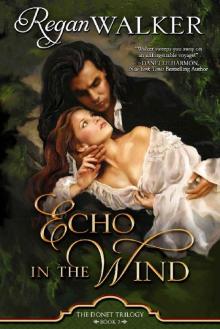 Echo in the Wind
Echo in the Wind Once Upon a Christmas Past
Once Upon a Christmas Past A Secret Scottish Christmas (Agents of the Crown Book 4)
A Secret Scottish Christmas (Agents of the Crown Book 4)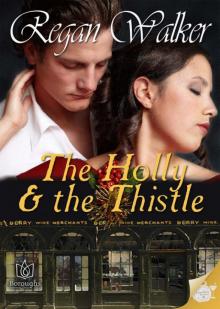 The Holly and the Thistle
The Holly and the Thistle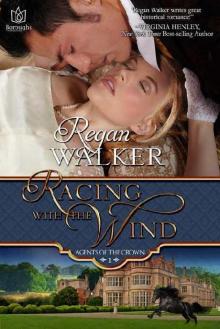 Racing with the Wind (Agents of the Crown)
Racing with the Wind (Agents of the Crown) Wind Raven (Agents of the Crown)
Wind Raven (Agents of the Crown) Rebel Warrior (Medieval Warriors #3)
Rebel Warrior (Medieval Warriors #3)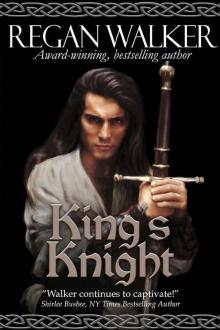 King's Knight (Medieval Warriors Book 4)
King's Knight (Medieval Warriors Book 4)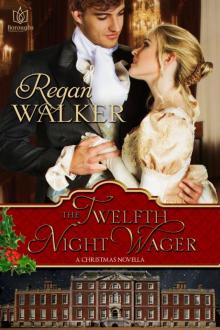 The Twelfth Night Wager
The Twelfth Night Wager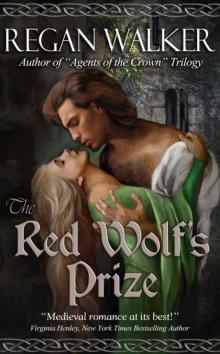 The Red Wolf's Prize
The Red Wolf's Prize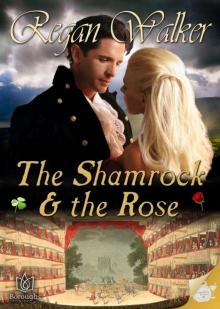 The Shamrock & the Rose
The Shamrock & the Rose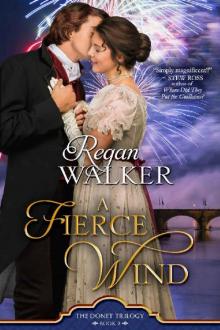 A Fierce Wind (Donet Trilogy Book 3)
A Fierce Wind (Donet Trilogy Book 3)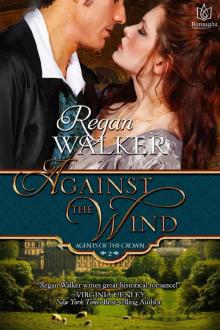 Against the Wind (Agents of the Crown Book 2)
Against the Wind (Agents of the Crown Book 2)